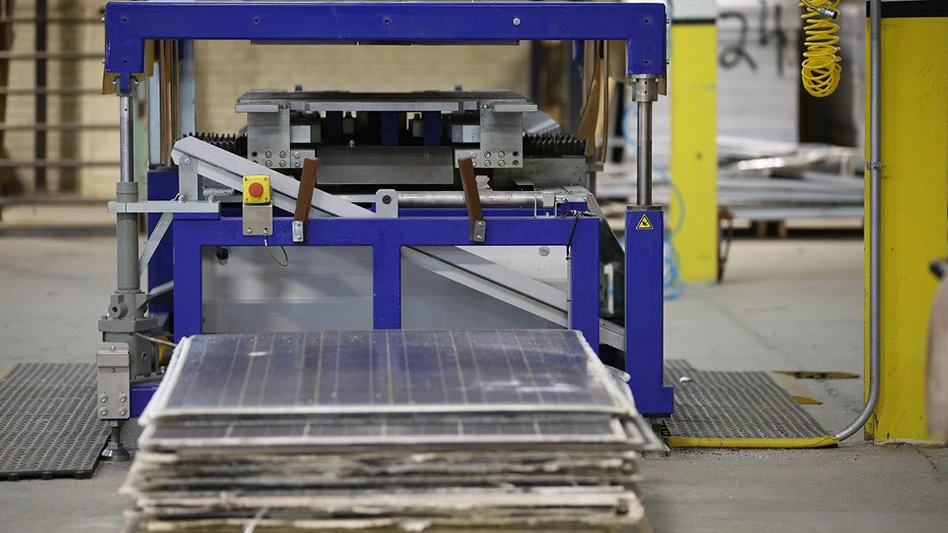
Photo courtesy of Commercial Solar Panel Recycling
The New Jersey Department of Environmental Protection (NJDEP) has granted its first Research, Development & Demonstration Project permit for solar panel recycling to Commercial Solar Panel Recycling (CSPR), which has a location in the Urban Enterprise Zone (UEZ) in Phillipsburg, New Jersey.
The RD&D permit, Certificate of Authority to Operate (CAO) a Research, Development & Demonstration Project to Manage Non-Hazardous End-of-Life Solar Panels, issued by NJDEP’s Bureau of Recycling & Hazardous Waste, Division of Sustainable Waste Management, enables CSPR to process end-of-life solar panels, recovering valuable materials, such as glass, aluminum and silicon, helping to reduce waste, conserve resources and promote a more circular economy.
“This permit represents a pivotal leadership moment in New Jersey’s sustainability journey, and we are proud to lead the charge in establishing a viable, scalable solution for solar panel recycling," CSPR co-founder Glenn Laga says. "By recovering and reintroducing valuable materials into the manufacturing process, we’re not only reducing New Jersey’s landfill waste but also creating new jobs in an emerging industry poised to manage the growing volume of end-of-life solar panels.”
The permit initiative is designed for Class D recycling facilities, or those that handle universal waste, and enables them to recycle solar panels until more comprehensive regulations are enacted. According to the consultancy Resource Management Associates, with an office in New Jersey, the permit caps daily solar panel intake at 100 tons and requires tracking where the solar panels came from and how they arrived at the facility and confirming they are nonhazardous. It also requires filing semiannual and final reports with the NJDEP.
Universal waste consists of hazardous materials that can be managed under streamlined requirements to encourage their collection and recycling. According to the NJDEP, businesses that generate or accumulate universal waste are subject to specific management standards depending on the type and amount of universal waste that is accumulated, though these requirements are less stringent than those for hazardous wastes.
“New Jersey, as a national leader in renewable energy, has a responsibility to ensure the environmentally responsible development of the infrastructure that will help us reduce climate pollutants,” New Jersey Environmental Protection Commissioner Shawn M. LaTourette says. “This research and development permit is the first step in ensuring that New Jersey will have the appropriate protocols in place to sustainably process end-of-life solar panels.”
"The NJDEP’s RD&D certification for solar panel recycling marks a critical step in advancing long-term solutions outlined in my newly introduced New Jersey Senate Bill 3399, which mandates end-of-life recycling for solar and photovoltaic energy facilities and structures,” New Jersey State Sen. Bob Smith adds. “This milestone and CSPR’s initiative as the first solar panel recycling operation in New Jersey are an exciting start toward a greener, more sustainable future.”
The CSPR facility in Phillipsburg is moving forward with its plan to use advanced technologies to recover valuable materials from solar panels, minimizing environmental impact and maximizing resource efficiency, according to the company.
In addition to a 35,000-square-foot processing facility in Phillipsburg, Commercial Solar Panel Recycling operates a second processing facility of the same size in Atwater, California. The company has additional sites in Somerset, Kentucky; Temple, Texas; and Mankato, Minnesota, according to its website, where it performs triage work.
Latest from Recycling Today
- BMW Group, Encory launch 'direct recycling’ of batteries
- Loom Carbon, RTI International partner to scale textile recycling technology
- Goodwill Industries of West Michigan, American Glass Mosaics partner to divert glass from landfill
- CARI forms federal advocacy partnership
- Monthly packaging papers shipments down in November
- STEEL Act aims to enhance trade enforcement to prevent dumping of steel in the US
- San Francisco schools introduce compostable lunch trays
- Aduro graduates from Shell GameChanger program





